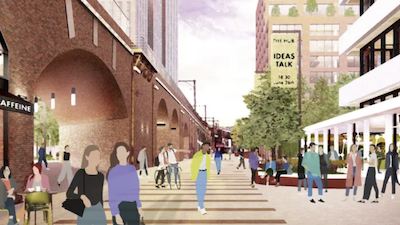A new £1.7 billion “innovation district” called Sister has opened the doors of its first building in Manchester.
The project, a joint venture between the University of Manchester and property firm Bruntwood SciTech, will get its first tenant in November when Sustainable Ventures, Europe’s leading climate tech hub, will move into the newly renovated Renold Building.
The 110,000 sq ft building, formerly one of the University’s teaching facilities, has been restyled as an innovation hub supporting the growth and scale-up of early-stage start-ups and spin-outs, with a range of low- and no-cost coworking facilities, private office suites, as well as a community cafe and flexible event spaces accessible to local businesses and community groups.
After Sustainable Ventures, a number of University initiatives will move in to the Renold Building, including: the Turing Innovation Catalyst Manchester, accelerating the growth of AI-start-ups; the Christabel Pankhurst Institute for health technology research and innovation; and the Industrial Biotechnology Innovation Catalyst, a cross-sector collaboration to empower the growth of biotechnology businesses.
Previously known as ID Manchester, Sister is situated near Piccadilly station on the former campus of UMIST (University of Manchester Institute of Science and Technology), which was amalgamated with the University 20 years ago.
Over 15 years, the project will encompass 4 million sq ft designed for innovative firms and is intended to elevate Manchester’s position as a national centre for science and technology. The University and Bruntwood said Sister will specialise in advancing innovation across sectors including digital tech, health innovation, biotechnology, advanced materials and manufacturing. The name Sister is intended to evoke the close bond between industry and academia.
The project’s backers say it will contribute around £1.5 billion gross value added per year to Manchester and a large portion of high-quality employment opportunities, including over 10,000 on-site full-time equivalent jobs and accessible routes to education, training and apprenticeships for local people.
The project includes more than 1,500 new homes alongside 2 million sq ft of commercial, innovation, retail and leisure space. Within 9 acres of public realm space, Sister will also create a new civic square for Manchester and feature a variety of new and enhanced green spaces for local communities to access and enjoy.
John Holden, Associate Vice-President, The University of Manchester and Executive Committee Member, Sister, said: “Sister will be home to some of the most exciting businesses in the UK developing solutions to help tackle society’s biggest challenges. We’re excited to open the doors to a vibrant new innovation district that will drive growth for ambitious start-ups and scale-ups, attract new science and technology companies to Manchester, and create new opportunities for our staff, students and local communities.”
Bradley Topps, Project Director, Sister and Chief Commercial Officer, Bruntwood SciTech, said: “This new district marks a new chapter in Manchester’s history of science and innovation. Over the next 15 years, we’re dedicated to developing an inclusive space that connects talent, investment, education and enterprise, providing the perfect conditions for ideas to spark, collaboration to flourish, and world-changing innovations to scale.”
Andy Burnham, Mayor of Greater Manchester, said: “Sister will be a thriving innovation district at the heart of Greater Manchester. With the Renold Building opening and welcoming its first occupier, we’re seeing the first signs of what this area will become – a home for start-ups, innovation-led businesses, universities, researchers and investors, where the clustering effect helps create jobs and opportunities.
“Sister is also a key site for our Investment Zone, which is supporting the growth of the advanced materials and manufacturing sector. Our city-region has been a centre of scientific and technological innovation for two centuries and places like Sister are where the next chapter of that story is written.”
